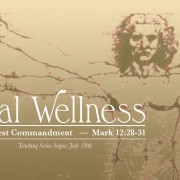Taking Over
/6 Comments/in Church Issues, Discipleship, Ministry, Pastoral Resources, Random Tangents/by debenmI was reading on Forbes.com a couple of weeks ago about the proposed buyout of Motorola Mobility by Google. The author, Eric Jackson, views the move by Google to be a misstep by current lead executive (and Google co-founder), Larry Page. At one point Jackson writes…
Academic research clearly shows that some of the riskiest strategic shifts for companies happen in a new CEO’s first year on the job. They want to put their mark on the place. They’re also much more self-confident than they probably deserve to be.
I must qualify what I write by making very clear that the senior or lead pastor ought not be viewed as or act like a corporate CEO. Plenty of pastors have made terrible mistakes by an overestimated view of themselves. Be that as it may, this quote resonated with me as I inherited an established ministry nearly 4 years ago, and have counseled a number of guys on their “first steps,” as they do the same. As long as I’ve been in vocational ministry I’ve served under a pastor lead model for church. Such a model affords a senior pastor a significant level of authority over the ministry, which has both it’s pros and cons.
There are unique realities when taking over an established ministry, which should be considered before the new lead pastor endeavors to make significant changes. The more I consider these uniquenesses, the more attractive birthing new works becomes, as new works are far more flexible. The culture of a church is, in many ways, established in the first 3 to 5 years of it’s life, and course corrections are more difficult for a church with an established culture. This being the case I think that it is very important that incoming lead pastors, taking over existing works, take to heart the truth behind Erick Jackson’s quote; even if it isn’t directed at pastoral ministry.
It is certain that there are changes to be made when a new pastor takes over a church. Many of those changes can be made without much grief or pushback within the first 12 to 18 months, as that is something of a honeymoon or grace period for a new pastor. Longstanding “members” of the fellowship will be more forgiving and gracious, even if they’re not fully in step with the alterations. In some ways I think that the body views such moves with a good level of openness saying, “Well, he’s the new guy,” or “He’s just learning; still a little young/green.” Whatever it is, it’s easier to get away with in the first year and a half.
When initial changes are made, some people will leave. Generally speaking, the people who leave in the first 6 months of a transition would probably have left anyway. Unless they themselves had taken over the church. The alterations that are made serve as a nice smokescreen for why they left. It’s a whole lot easier to say, “I really didn’t like the change they made to the service order,” than “I don’t like the new pastor.” Not everyone will be able to connect with the “new guy” as the transition takes place.
Over the last four years I’ve discovered that the church is like a wife. I realize that this is not a totally insightful observation; she is called the “Bride of Christ.” I want to say what I’m going to say as delicately as I can, because I’m sure someone is going to misunderstand what it is I’m trying to say. A church, like a wife, desires security. The pastor is not the groom, clearly Christ is the groom and the church His bride. Be that as it may, the church still desires a level of security and consistency. A senior leadership change affects the consistency and can shake the security, so I’m convinced that making frivolous moves to to put the mark of the new leader on the place, which amount to nothing more than cosmetic window dressing, are unnecessary (e.g. “Let’s change the name to something cool”).
My counsel for new guys is simple.
- Be strategic. Be calculated. Think through the ramifications of the changes, as ideas and adjustments have longterm consequences.
- Fundamental changes to the vision and mission of the local body should only be made if it is clear that the church has been off course or without vision.
- Vision/mission corrections should have firm Biblical basis (e.g. What is the mission of our church? To make disciples by equipping the saints).
- Larger changes ought to be done incrementally. If a new [smaller] church plant is like an agile speedboat, an established larger church (or cultured church) is more like an aircraft carrier, which takes time to turn. So, instead of making a hard 90º turn, it may take six 15º moves to go in the new direction.
It’s definitely characteristic of youthfulness to desire to do things quickly, but when taking over, it’s good a good reminder… take your time.
Understanding Your Context – Daniel Fusco
/4 Comments/in Apologetics, Bible, Call of God, Church Issues, Church Planting, Culture, Discipleship, Evangelism, Ministry, Pastoral Resources, Practice, Random Tangents, Revelation, Social Responsibility, Trends/by danielfuscoWhen I speak with church planters, I always want to find out about the area that they are ministering. I ask them about the community, its values, its style, the demographics, etc. I find that oftentimes men haven’t taken the time to do any cultural exegesis. At first, this took me aback. But then I remembered that when I planted the church in New Brunswick, I did barely any cultural exegesis. I was a young man with a Bible who knew that faith comes by hearing and hearing by the Word of God. I had seen the Lord change my life and I had a passion to see people experience that same change. So I set on out, without thinking much about where I was, the uniqueness of the area, etc. Even when we first began, although I was saying all the right things about my understanding of the community, the reality was that I didn’t really take the time to understand the average person in New Brunswick. I didn’t love the community enough to want to really know and understand them. The ministry suffered because of this. Not because I didn’t teach the Word, but because I did but not in a way that anyone could understand. It suffered because I exported the ministries that I had seen at the church that I was an Assistant Pastor at, rather than seeing my area for what it was and tailoring the ministry accordingly. So now, we’re going to look at ways of understanding our ministry context as well as some of the pitfalls that church planters face.
The Most Important Thing about Contextualization
The Gospel of Jesus Christ is unchangeable. It is fixed. It cannot be altered and still be honoring to God Himself. But how we communicate these truths need to be changeable. They will change as the times do and as the culture does. The reason that I say this is the most important thing about contextualization is that many people don’t want to contextualize the gospel because many people change the Gospel to reach a culture (this is called syncretism). This is wrong. But you can package the gospel in such a way as to keep people from actually being able to hear it. Imagine if you were interested in using a new computer. You go and talk to a ‘professional computer guy’ and he speaks to you in very technical, computer geek language. Within a few minutes, you are completely lost and your eyes glaze over and you decide that learning about the new computer is not for you. Is it that you weren’t really interested in learning or was it that the computer guy just shot soo far over your head that you just couldn’t get it? I’m sure a lot of our churches are like this. So in any discussion about contextualization needs to begin and end with the unchangeable gospel that God asks each of us to package specifically for our target audience, our community.
The Scriptures are Completely Contextualized
This was a mind-blowing realization to me. There are four Gospels. Each one has a different audience. Matthew, writing to Jewish people, quotes extensively from Scripture and is constantly looking at the fulfillment of prophecy in the life of Jesus. Mark’s Gospel has very little of this, as he was writing to a different audience. You’ll notice in Luke’s Gospel how he is always clarifying things to explain things that the average Roman wouldn’t understand about Jewish culture. Each of Paul’s epistles are contextualized to a specific area. The Galatians were struggling with the Judaizers, so Paul spoke to them about the necessity of faith apart from works. The church in Corinth was simultaneously spiritually gifted and carnal. So Paul shared to them the unsearchable riches of Christ within their context. Although all of this is God-breathed, it was inspirationally directed to a specific group of people. Not only were the words and concepts inspired, but also that those words and concepts were to be directed to a specific target audience! Jesus was incarnate into first century Judaism. He looked and dressed as they did. He understood how they were raised, as He was raised the same way. He spoke their language. If the Lord would have been incarnate say today in New York City, the Gospels would contain the same truth, but in drastically different packaging. One of the keys to understanding your context and ministering effectively within it is to ask the simple questions (with radically important answers), “If Jesus were to be incarnate today into (insert your location here), what would His ministry look like?” “If the Apostle Paul was doing his missionary work in (insert your location here), where and how would he do his ministry?” Then you should ask the question, “Why aren’t I doing these things?”
Demographic Research Is Not Unspiritual
I had always thought that it was unspiritual to look at demographics. As if using demographics somehow made your calling of God of a lesser effect. I had heard people speak ill of Rick Warren for surveying the area that he hoped to plant in to find out about what the people’s experiences with church and their perceptions of what would be the type of church they would attend. He found, among other things, that people wanted sermons that had real life application to it and they wanted a church that really valued their children. I believe that God wants these things as well for His church. Wikipedia defines demographics as ‘Demographic or demographic data refers to selected population characteristics as used in government, marketing or opinion research, or the demographic profiles used in such research. Commonly-used demographics include race, age, income, disabilities, mobility (in terms of travel time to work or number of vehicles available), educational attainment, home ownership, employment status, and even location. Distributions of values within a demographic variable, and across households, are both of interest, as well as trends over time.’ Demographics are simply a compendium of who lives in your area. It was completely illuminating to read the US Census Data for Mill Valley, California where I currently serve. The people here are 90% Caucasian. 60% of the people have a college degree and one in three people have an advanced degree. The average per family income is more than twice the national average. This simply teaches me that the people here are primarily Caucasian, wealthy, successful and very well educated. This has profound implications for ministry style and approach. Would it be wise to come into a primarily Caucasian area and harp on the need for the ministry to be multicultural? With the education of the area that I am in, I have to make sure to anticipate the intellectual arguments of very well educated people and pepper all messages with this. Demographics are a snapshot of the makeup of your community. You want to know who you are trying to reach and make sure that your approach takes into account the people you are trying to reach and not just your own personal preferences.
We Absolutely Need to Understand the Average Person in our Community
Now I hate to say this but you won’t understand the average person in your community reading Bible commentaries and listening to your favorite pastors. Don’t get me wrong, you need to study to show yourself approved and be edified. But this will not help you understand your missiological context. Are your neighbors reading Bible commentaries? It is doubtful (although we wish they would). Do your neighbors really care about what some group of Christians are doing in some place that they’ve never been that you don’t agree with? Again, it’s doubtful. But oftentimes, this is what pastors do.
I have found that in order to understand the people that you are called to minister to, there are certain things that you can do to aid yourself.
1) Purposefully vary your people context.
Make sure that you spend time with non-Christians and find out what is important to them. It is really easy for church planters and pastors to spend all of their time with folks from within their congregation. It is essential and a disciple to vary your people context. Find out where they get their information from, the books they like, the movies that seem important to them and what they laugh at and why. Talk to them about sports and politics, but not to argue with them, but to understand them.
2) Read their information sources.
Read your local newspaper if it is popular and widely read. Read magazines that are targeting a population that is similar to your own. Read the popular books in your area. You can go into the local large bookstore change and ask them for their list of the most popular books that the store has sold. It’s a good idea to buy a book or two and read it with a mind to both understand your target population and also have a point of contact to begin dialoguing with people about (like Paul’s ‘Unknown God’ reference in the Book of Acts). I have found that magazines are easier than books as they are shorter and not as involved/time consuming. Also, if your area is strongly of a certain political flavor, you want to really understand their worldview so listen to their pundits, even if it makes you a bit nuts. If you want to understand whom you are trying to reach, you’re going to have to make some sacrifices.
3) Find the Points of Commonality
As you speak to people and as you digest their information, find the areas that you can agree on with the culture at large. Most people are used to Evangelicals being completely adversarial in their approach. It turns them off, just as it would us, if we were in their shoes. In almost every culture, there are things that there is agreement on. It’s important to find those points and use them as a relational bridge.
4) Proximity Breeds Accountability
I always encourage church planters to live directly in the community that they are called to. You want to live in the same context as they do. People will consider you irrelevant if you are living in the suburbs and trying to plant a church in the middle of a city ghetto. Your contexts are different and they will see that. You want to shop where they shop, work out where they work it, have the same weather, etc. And by all means, if you move into an area, change your cell phone number to have the same area code as everyone else, there is nothing that says ‘outsider’ more than having a cell phone number from some unheard of area code. And on that note, get your license plates changed ASAP if you move across state lines.
5) Teach As If Your Community’s Seekers Are There
If all of your messages are directed at evangelical people and are concerned with evangelical sub cultural discussions, then the only people who will be interested in them are evangelicals. But in most of our communities, there are less and less evangelicals and more and more people who don’t go to church. If you ever hope to reach your community, you want to make sure that you are teaching to an audience (whether you are in actuality or not) who includes those who are not yet Christian. Don’t just invalidate the average concerns with mockery. Those are real people’s concerns. Teach the Scriptures and show the community God’s love from them by lovingly addressing their most common concerns and explain to them how that concern is either unfounded or way more important than they realize. When you teach, teach as the average person in your community is there, and Lord willing, one day they will be and there will be conversions in the church.
6) Make Sure that You Really Love Them
Love is always relevant. I often think of Jesus eating with the tax collectors and sinners. He was nothing like them, at all. But yet He loved them and spent copious amounts of time with them. Even though He was distinct from them, He was there with them and no doubt, they knew that He loved them. We need to make sure that we love the community that we are trying to reach. We need to beg God for His heart for the people. He loves them. Jesus Christ died on a cross so that those who would come to Him might have life and have it more abundantly. God give us your heart of love for our communities.
Inexplicable God
/4 Comments/in Apologetics, Bible, Culture, Discipleship, Evangelism, Ministry, Pastoral Resources, Random Tangents, Trends, Uncategorized/by kellencriswellOne of the most mind-bending and yet rewarding things we can do is meditate on the trinitarian nature of God. While not all agree, the Trinity, or Triune nature of God, is a reality most definitely affirmed by the teaching of Scripture. The biblical testimony portrays God as existing as three separate persons who all equally share one divine essence. These persons have revealed themselves as God the Father, Jesus (who is God the Son), and God the Holy Spirit in the Bible.
The Bible and the Nature of God
The biblical teaching on the nature of God can be summarized as follows:
1. The Father is God (Jn. 6:27)
2. The Son is God (Jn. 1:1-3; Heb. 1:7-8; Col. 1:13-17)
3. The Spirit is God (Gen. 1:2; Job 33:4; Ps. 104:30; Acts 5:3-4; Acts 13:1-4)
4. There is only One God (Deut. 6:4; Mk. 12:32; Rom. 3:30; 1 Cor. 8:6)
5. The Father, Son, and Holy Spirit are NOT each other (Matt. 3:16-17; Jn. 1:1-3 & 18; Matt. 28:19; 2 Cor. 13:14)
What Does the Biblical Data Mean?
The Bible clearly teaches each of the above five realities regarding the nature of the One true God. There is only One God. He exists in the three Persons of the Father, Son, and Holy Spirit. Each of the three are divine, and they are not One another. They are not three separate God’s. They are not one divine Person portraying Himself three separate ways. They are three literally distinct Persons unified by one divine essence.
Um, Can You Explain that Please?
Usually this is the point that our brain starts to hurt. As we try to stretch our finite minds to the point where we can wrap our proverbial arms around the awesome and infinite reality of God’s nature, feelings of futility and inadequacy soon follow. While we can certainly apprehend the biblical teaching regarding the Triune nature of God, we cannot fully comprehend it in it’s fullness.
How ’bout an Illustration?
The truth is that we cannot even adequately illustrate the Trinity. Many have tried to do so, and I personally believe they have done so in vain. Even the closest illustrations fall short at the end of the day. Let me point out the most common illustrations people set forth in attempt to better understand or articulate the reality of the Trinity:
1. The Clover- Some say that to illustrate the nature of God to the people he was trying to reach in Ireland, Saint Patrick would point to the three-leaf-clover. He would suggest that the nature of God is like a clover that, while being one entity, has the three parts in the leaves which ultimately all connect as one.
2. The Egg- Some suggest that the fact that an egg has three parts (yoke, white, and shell) while still being one egg can serve as an illustration of the Trinity.
3. The Water- Others point to water which can exist in three forms (gas, solid, liquid) as an illustration of the Trinity.
4. The Family- Still others would point to the family as a potential illustration of the Trinity. Admittedly this is my personal favorite. These folks point out that, biblically speaking, men and women become one flesh through marriage and sexual relations. When parents reproduce and have a child, the child genetically proceeds forth from the essence of both the father and mother who are one flesh through marriage. In the end, it is contended that this illustrates the Trinity in that the human father, mother, and child are all three separate persons and yet one in a legitimate sense.
The truth is all of these illustrations fall short for various reasons. And while helpful for lifting our minds to a perhaps good starting place as we begin to try and appreciate the complexity and beauty inherent within the Triune nature of God, none of these should serve as absolute pictures of the precise nature of God.
Reaction Time
When we get to this point in meditating on the Trinity, I have found people react in two ways depending on where they’re at with Jesus in their personal lives. First of all, the skeptical non-Christian begins to mock. They say, “If I can’t explain it, or find something of comparable nature to illustrate it, it must not be true.” Secondly, the new or untaught Christian might begin to doubt. They might find themselves thinking, “Can this be true if we cannot explain it? Are the skeptics correct, and the Trinity is just another made-up human superstition?”
Answers for the Skeptic
In response to the skeptic I would say three things:
1. Either the Bible is God’s Word, or it isn’t. Many who are in opposition to the doctrine of the Trinity also affirm the inspiration of the Bible. Their are some religious groups who affirm the divine inspiration of the Bible, and yet because the Trinity doesn’t make sense to them logically, they reject it and come up with other translations of Scripture foreign to the original languages in which the Bible was written for the sake of supporting their view. This is all done to justify making Scripture conform to their logic, rather than bringing their supposed logic into conformity with the plain meaning of Scripture. At the end of the day either the Bible is God’s Word and must be accepted, or it’s not. But you can’t have your cake and eat it too on this one. If the Bible is God’s Word the Trinity is the only possibility based on the teaching of the whole counsel of God as summarized above. Either the Bible is God’s Word or it’s not.
2. Don’t think more highly of your logic than you ought. Don’t you think it’s possible that there might be some things that are true about the infinite, sovereign Creator of the universe that are just a little difficult to wrap your much smaller, finite mind around? Do you really think you’re so smart that you should be able to fully wrap up everything about the nature of God in a nice little intellectual package that is easy to understand and explain? Don’t think more highly of your logic than you ought.
3. Don’t be a hypocrite. The fact is that every skeptic who scoffs at the doctrine of the Trinity based on it’s incomparableness is a hypocrite. They know that there are many things they affirm to be true though they can’t fully understand or explain them. I know there are many things like that in my life. There are things that I know are true, that are scientifically explainable, that I still can’t fully comprehend. I know there are scientific explanations regarding how giant aircraft carriers made of steel, transporting thousands of people, planes, and supplies can float in the water, but it still doesn’t make sense to me. I know science can explain why it is that a fly can float in the cab of my truck while I’m driving 75 down the freeway and not splat against my back window, even though I know that fly isn’t moving in the same direction as my vehicle, at the same speed. And yet, if I were to stand up and jump in the air in the back of my truck going the same speed, I would be dead in the road. How does all that work? I mean, is there a problem in the matrix, or what? You can explain it to me scientifically, but it still won’t fully make sense. I believe even the most ardent skeptics regarding the Trinity hold to many truths in their lives which they apprehend and affirm while knowing they cannot fully explain or comprehend them. The honest skeptic would agree. Don’t be a hypocrite.
Answers for the Christian
For the new or untaught believer who is struggling with doubt over their inability to articulate, understand, or illustrate the Trinity, I would comfort you with the truth of Isaiah 40:18: “To whom then will you liken God? Or what likeness will you compare to Him?” In short, the Bible itself declares the inexplicable nature of God! We don’t need to worry about not being able to explain or illustrate what God has already told us is inexplicable and without illustration. Part of being God is being absolutely unique amongst all other things in existence! The reason you can’t point to an illustration and say, “That is what God is like,” is because He is altogether unique and incomparable in every single possible way!
At Refuge we like to say in regard to meditating upon the mysterious nature of our God that, “Logic can only take you so far before all you can do is stop and worship in awe!” I hope this brief reflection on the inexplicable nature of the One True and Living God has inspired you to do that. Let logic, reason, and understanding take you as far as it can. And when you come to the end of that finite road, worship the Father, Son, and Holy Spirit who together exist as our One True God!
From The Archives…
/0 Comments/in Bible, Call of God, Church Issues, Ministry, Pastoral Resources, Practice, Random Tangents, Uncategorized/by josholson“Ask what I shall give thee.” 1 Kings 3:5
These are the words of the Lord God of Israel to the third king of Israel, Solomon. And I take great great comfort in these words from God because they are so applicable to me today.
The context of God’s offer is an interesting one. At least ten (10) times, definitely more, does God’s word speak of the Lord establishing Solomon’s throne. (“Let God be true and every man a liar.” Romans 3:4).
Then, at the beginning of 1 Kings 3 we see Solomon breaking one of God’s laws for the king…he joins himself, and thereby the kingdom and people of the Lord, to Egypt, by marriage to the daughter of Pharaoh. He then brings her to Jerusalem, but not until the temple of God is built (which is 7 years), and not until his palace is built (which takes 13 years), and not until the city of Jerusalem is walled in. Even if these events took place concurrently and were all accomplished within 13 years, in the midst of this activity something is strangely missing. And that missing component is the voice of God.
Why the long silence?
King Solomon has compromised. The result? Verse 2 of 1 Kings 3 begins thus, “Only the people sacrificed in high places.”
Only?
All those years before the temple was built the nation sacrificed in high place.
Verse 3 tells us, “And Solomon loved the Lord…only he sacrificed and burnt incense in high places.”
Only?
Verse 4 says “The king went to Gibeon to sacrifice there; for that was the great high place…And the king made a ‘great’ sacrifice, as well. A thousand burnt offerings!”
And what happened to Solomon? Is he struck dead? Does he contract leprosy? No. Verse 5 tells us, tells me, that God came to Solomon.
“And God said, “Ask what I shall give thee.””
In the midst of compromise and sacrificing and burning incense on high places, the greatest of high places, God, in His mercy, appears to Solomon in a dream and says, “What do you want Me to give you, Solomon?”
What comfort! What encouragement! To know that God comes to me when it seems so long in not hearing His voice because of compromise. Just as He is stirring my heart this last week, He comes, through the Living Word, and asks me today, “Ask what I shall give thee.”
“Ask of Me, and I shall give the the heathen (the nations) for thine inheritance, and the uttermost parts of the earth for thy possession.” Psalm 2:8
“Call to Me, and I will answer thee, and shed thee great and mighty things, which thou knowest not.” Jeremiah 33:3
“Ask and it shall be given you; seek, and ye shall find; knock, and the door shall be opened unto you. For everyone that asketh receiveth; and he that seeketh findeth; and to him that knocketh it shall be opened.” Matthew 7:7-8
“And he cried, saying, “Jesus, Son of David, have mercy on me…but he cried so much the more, “Thou Son of David, have mercy on me.”
“…He asked him, saying, “What wilt thou that I shall do unto thee?” Luke 18:38-41
He is asking me, He is asking you…
“Ask what I shall give thee.”
“What wilt thou that I shall do unto thee?”
“Ask of Me…”
Call to Me…”
“Ask…”
“Seek…”
“Knock…”
“What wilt thou that I shall do unto thee?”
Preached, Received, Standing-fast & Saved
/0 Comments/in Podcast/by debenmPastor Miles DeBenedictis
1 Corinthians 15:1-2
Preached, Received, Standing-fast & Saved
Total Wellness #7 – Loving Your Neighbor – Daniel Fusco @ Calvary North Bay
/0 Comments/in Podcast/by danielfuscoMultiple Sites: Yea or Nay?
/8 Comments/in Church Issues, Church Planting, Trends/by admin
Thoughts?
Hard-wiring and conviction–my internet input dilemma!
/11 Comments/in Bible, Church Issues, Church Planting, Discipleship, Ministry, Pastoral Resources/by jeffjacksonBecause of the way God has wired me personally and as a result of my understanding of what I believe He has revealed as the responsibilities for one of His under-shepherds, my interaction with all things internet related, including this blog, leaves me self-conflicted on a regular basis. When I couple those two realities with the fact that I’m also a techno-lamer, I give myself enough ammunition to beat back the frustration I feel with myself about not being more active on this incredibly interesting and relevant blog.
Clearly, this blog serves an important purpose for those called to pastor and/or plant churches and is highly relevant to pastors and church leaders. I absolutely love the way these things are discussed with honesty and vulnerability and I’m convinced that this blog is “scratching an itch”. Since I believe this is true, my prayer is that what I’m about to share will be of some help to others who may be experiencing a dilemma similar to mine. What dilemma?
Keeping the proper balance between the time it takes to love, serve, and lead the people in the church God has called me to pastor, and the time it takes to read, comment on, and contribute to this blog. I find enjoyment and encouragement in both endeavors and therein lies the rub.
As is fairly obvious to those of you who know me personally and anyone else who reads this blog regularly, if given an opportunity to either spend a portion of time with a member of my church or spend that same time in front of my computer, I almost always choose the time with another person. Here’s why:
FIRST: My personal hard-wiring
I LOVE face to face interaction and relationship with people. I genuinely love hearing a person’s “story” and their description of their current life, struggles and all. But I always prefer hearing these things in the context of a face to face encounter. Especially if they are convinced God has called them to be a part of the local body that He has called me to pastor. If I can’t see the tilt of their head, the lifting of their eyebrows at key moments when they tell me about how surprised they were about something, what they’re doing with their hands as they describe crucial events that have happened to them–in a nutshell, if I don’t see firsthand those mannerisms that are a part of making them uniquely who they are, then I’m not sure how effective I can really be in helping them progress into Christ-likeness.
I’ve been described as a “people-person” by the majority of the people who know me at almost any level. That probably is an accurate description of me. But if I truly am that kind of person, it’s obviously because God hard-wired me to be that way. And I’ve discovered that when I operate in the realm I’m hard-wired for, I find joy and fulfillment. And, those I know and serve relationally feel love and find encouragement as they progress in their walk with Jesus and God is glorified.
Of course, being hard-wired by God as a “people-person” doesn’t qualify someone to serve as a pastor. But I do believe that it is one of the key components of the inventory God gives a man He calls to shepherd His people. It’s similar to the idea that every pastor must be gifted with the ability to teach but not everyone with the ability to teach is gifted or called to pastor. Pastors must have people skills but not every believer with people skills is called to be a pastor.
My conviction about the role of a pastor based on my understanding of God’s Word:
The Word has much to say about those who shepherd God’s people. Much can be learned from Jesus and His interaction with the apostles, the larger group of disciples, and of course, the multitudes. In His brief discussion with Peter in John 21:15-17, He made clear that regardless of the level of love Peter had for Him, Peter is commanded to feed, (2x) and to TEND His sheep. The remainder of the New Testament gives many examples of what shepherding God’s flock looks like and there are even 3 specific books in the New Testament devoted to helping young pastors to do that.
But personally, the text that really encapsulates what God expects of those He calls to shepherd His people is found in Ezekial 34:1-6. When I look at the things He accuses the shepherd’s of NOT doing, I don’t believe I’m going astray by inferring those are the exact things He expects the shepherds of His people to be doing. I admit that in the context in which this was written the word “shepherd” was probably referring to more than just the priests, (perhaps prophets and civil leaders too). But clearly, the primary targets of this rebuke through Ezekial are those responsible for the spiritual care of His people. There are 6 key areas that God holds the shepherds of His people responsible for:
Vs. 2,3 (1) Feeding the flock, not using the flock to feed themselves and their egos and lifestyles. This is mentioned first and I believe is the number one responsibility of the shepherd, just like Jesus told Peter.
The remainder of what God expects His shepherds to be doing for His flock is the fleshing out of what Jesus meant when He told Peter to TEND His sheep. In other words, this is what “tending” the sheep looks like:
Vs. 4 (2) Strengthening the weak
(3) Healing those who are sick
(4) Binding up those who are broken
(5) Bringing back those who have been driven away
(6) Seeking those that get lost
What the above descriptions look like in the context of a local church, even a local church today, isn’t difficult to unpack. I trust that God is able to show a pastor of a local church how these principles are put into practice in the context in which he and the people God has called him to shepherd reside.
But what I can’t escape….what provokes me personally to pastor the way that I do, is that the only way I can truly know which of the sheep are weak, sick, broken, have been driven away, or wandered away and are now lost, is if I spend some significant time face to face with them on a regular basis. As they live life day to day in the crazy but real world of our community, I’ve been given the privilege and the time to build deep, meaningful, and real relationship with them so that I can know them and be known by them. This is what makes it possible for me to tend to them at the level that God clearly expects me to.
I learned an interesting lesson connected with what I’ve just written when I planted a church the first time. I’ve passed it on to other young men feeling called to church plant and/or pastor over the years. Here’s what I tell them:
“Your first and primary responsibility as a pastor is to feed, (teach), the flock, no question about that. But it won’t be your great teaching ability that will keep the people in your church, (since very few people are actually good teachers when they first begin pastoring). No, what will keep them with you is your genuine love for them that you express by spending time with them as individuals and as families, getting to know them and letting yourself be known in their homes and your home, not the church building. And when your teaching gift really does develop and the church grows, don’t fall into the trap of being so busy using your teaching gift for the crowds that you no longer have time to tend to the flock in the same way you did at the beginning. If the church grows to the point where you can no longer tend to them, then train and tend to the leaders who will tend to the flock. But tend to the leaders the same way you used to tend to the flock–individually and with families in their homes and you own”.
When I pile the reality of being a techno-lamer on top of this conviction I have about God’s expectation for those who shepherd His people which is already piled on the way He’s hard-wired me as a person, I come face to face with the dilemma that I pray I’ve made understandable.
As stoked as I am about the interaction, fellowship, and encouragement I find on this blog with all of you, I must keep my face to computer time limited so that my face to face time with my flock is not diminished. I know that my interaction with all of you through this blog is minimal, and I sincerely regret that. But please know that it isn’t the result of a lack of desire, it’s primarily because of my hard-wiring and my conviction about being a shepherd of God’s people.
Lessons Learned On the Trail
/4 Comments/in Call of God, Church Issues, Church Planting, Culture, Ministry, Practice, Trends/by chuck
 Church planting is often referred to as trail blazing ministry. I think that would’ve been true maybe ten years ago but that is probably not the case today. The reason is that so many people are walking that path today that it has become a highway. Don’t get me wrong many people are blazing new ground in very hard areas to reach but with the technology and resources out there it has become incrementally easier than a decade ago.
Church planting is often referred to as trail blazing ministry. I think that would’ve been true maybe ten years ago but that is probably not the case today. The reason is that so many people are walking that path today that it has become a highway. Don’t get me wrong many people are blazing new ground in very hard areas to reach but with the technology and resources out there it has become incrementally easier than a decade ago.
Blazing a new trail is hard work. I ride mountain bikes on some of the best and most beautiful trails in all of California. Those paths are well defined and have been put there by people who did a lot of back-braking work. Just recently a guy in our church decided to develop a new trail which runs right behind my office. We decided to meet after church one Sunday to do some manual labor on the trail. We never made it.
First he decided to pre-ride the trail before I got there and ended up bending his derailer on tree stump that was sticking out. Just as he was getting hauled off the trail by a friend I started on the same trail. I got to a bridge, which I promptly rode off, and bent my front rim. My friend had to come pick me up.
The thing is that established trails are so much more fun because they are defined. They may be difficult due to hills and soft sand but all in all you have a good time while you are out there. New trails are no fun at all. They are poorly marked out, many elements that can do serious damage to your bike, and you often have to backtrack because you got off the path. Usually when you are frustrated by time you are done riding.
This got me thinking about blazing new trails in ministry. You see many of us want to be seen as out in front of the pack blazing trails (i.e. as church planters) but few of are willing to truly do the legwork necessary to develop new trails of ministry. The reasons for that are not always clear seen.
Here are three needed to cut new trails:
- You Have To See a New Path No One Else Does: The hardest part of starting a new trail is determining the direction you want to go and having an idea how you want to finish. My friend is a biology teacher. He chose to cut his path along the natural flow of the animals who live in the area. It wasn’t logical or efficient but the trail developed quicker than if he had used other indicators like ease of use.
This is more than just vision. This is being able to see things that others can’t right now. It is being able to see the connection between what you are doing right now and where you want to go. This take fortitude. - You Have To Go Over the Path Multiple Times: Once you complete the path you will often find that no one is ready to follow you yet. This is because they can’t see what you do. This necessitates you going over and over the path to make clear designations. People want to know where they are going. Our turning from trail blazer to trail guide helps calm their fears.
So many people take the Lewis and Clark approach to ministry. They do something once, get some notoriety, and then they hit the speaking and book circuit. Being known for the trail that we cut should only be a fruit of the whole reason we cut the trail in the first place - Your Path Has to Go Somewhere: Some of the best trails are never ridden because they go nowhere. Mountain Bikers want ride trails that connect to other trails so that they can go somewhere. Blazing a new trail for the sake of doing something new will end up in a dead end or an unused trail. I have met so many people in ministry who have developed great programs, systems, and events that never caught on because people couldn’t see the value in it. Don’t get caught up in doing a new thing without seriously considering the benefit of it. Being trendy only last for a while because something new comes along.
The best paths that are blazed are those that God has led us down out of necessity. They are total faith walks. Let God use you to blaze new trails.










